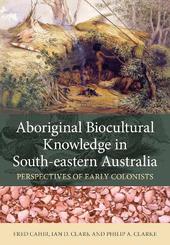
|
Aboriginal Biocultural Knowledge in South-eastern Australia: Perspectives of Early Colonists
Paperback / softback
Main Details
| Title |
Aboriginal Biocultural Knowledge in South-eastern Australia: Perspectives of Early Colonists
|
| Authors and Contributors |
By (author) Fred Cahir
|
|
By (author) Ian D. Clark
|
|
By (author) Philip A. Clarke
|
| Physical Properties |
| Format:Paperback / softback | | Pages:360 | | Dimensions(mm): Height 245,Width 170 |
|
| Category/Genre | Management of land and natural resources
Sustainability |
|---|
| ISBN/Barcode |
9781486306114
|
| Classifications | Dewey:578.60899915 |
|---|
| Audience | | Professional & Vocational | | General | |
|---|
|
Publishing Details |
| Publisher |
CSIRO Publishing
|
| Imprint |
CSIRO Publishing
|
| Publication Date |
1 May 2018 |
| Publication Country |
Australia
|
Description
Indigenous Australians have long understood sustainable hunting and harvesting, seasonal changes in flora and fauna, predator-prey relationships and imbalances, and seasonal fire management. Yet the extent of their knowledge and expertise has been largely unknown and underappreciated by non-Aboriginal colonists, especially in the south-east of Australia where Aboriginal culture was severely fractured. Aboriginal Biocultural Knowledge in South-eastern Australia is the first book to examine historical records from early colonists who interacted with south-eastern Australian Aboriginal communities and documented their understanding of the environment, natural resources such as water and plant and animal foods, medicine and other aspects of their material world. This book provides a compelling case for the importance of understanding Indigenous knowledge, to inform discussions around climate change, biodiversity, resource management, health and education. It will be a valuable reference for natural resource management agencies, academics in Indigenous studies and anyone interested in Aboriginal culture and knowledge. Cultural sensitivity Readers are warned that there may be words, descriptions and terms used or referenced in this book that are culturally sensitive, and which might not normally be used in certain public or community contexts. While this information may not reflect current understanding, it is provided by the author in a historical context.
Author Biography
Fred (David) Cahir is an Associate Professor in Aboriginal Studies at Federation University Australia in the Faculty of Education and Arts. His Masters and PhD focused on local Victorian Aboriginal history. His research interests include Victorian Aboriginal history, Australian frontier history, Aboriginal heritage tourism history, Aboriginal biocultural knowledge and toponyms (place names). Ian D. Clark is a Professor of Tourism in the Business School at Federation University Australia. He has a PhD in Aboriginal Historical Geography from Monash University. He has been researching Aboriginal history since 1982. He has been the manager of the Brambuk Aboriginal Cultural Centre in Halls Gap, and the History Research Fellow at AIATSIS in Canberra. His areas of interest include Aboriginal history, the history of tourism, and place names. Philip A. Clarke is a consultant anthropologist, working in native title and Aboriginal heritage. With an academic background in both science and anthropology, his research interests are focused on the ethnosciences, in particular Australian ethnobiology and ethnoastronomy.
|